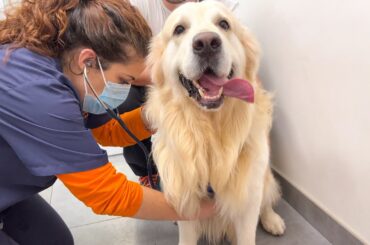Golden Retrievers are known for their sociable and friendly nature, and they generally thrive on human interaction. While they can adapt to being alone for short periods, leaving a Golden Retriever alone for extended periods may not be ideal for their well-being. Here are some considerations regarding leaving Golden Retrievers alone:
1. Social Animals:
Golden Retrievers, renowned for their social nature, genuinely thrive on human interaction. Their deep-seated love for companionship makes extended periods alone challenging for them. They form strong bonds with their human family members and may experience feelings of loneliness when left without company. It’s crucial to recognize their social needs and take steps to ensure they feel connected and secure, even during your absence.
2. Separation Anxiety:
Golden Retrievers are susceptible to separation anxiety, a condition that can manifest in various stress-induced behaviors. Excessive barking, destructive chewing, or house soiling are common signs of distress when these dogs are left alone. Addressing separation anxiety requires a multi-faceted approach, including gradual training, positive reinforcement, and creating a comfortable environment to ease their stress during your time away.
3. Exercise and Mental Stimulation:
Being an active breed, Golden Retrievers thrive on regular exercise and mental stimulation. Extended periods of solitude without proper outlets for their energy can lead to boredom and potential behavioral issues. To address this, incorporate varied and stimulating activities into their routine, ensuring they stay physically and mentally engaged, even when you’re not there to interact with them.
4. Training and Gradual Alone Time:
Introducing your Golden Retriever to alone time should be a gradual process. Start with short durations and incrementally increase the time as they become more accustomed to being by themselves. Positive reinforcement during these alone periods, combined with engaging toys, can create a positive association and help alleviate any stress or anxiety associated with being alone.
5. Consider a Companion:
Considering the social nature of Golden Retrievers, having a companion, such as another dog, can significantly contribute to their well-being during your absence. The presence of a furry friend provides companionship and can reduce feelings of isolation, offering a social outlet when you’re not around.
6. Doggy Daycare or Pet Sitter:
For individuals with busy schedules requiring extended periods away from home, enrolling your Golden Retriever in doggy daycare or hiring a reliable pet sitter can be a valuable solution. These options ensure your dog receives attention, exercise, and companionship, maintaining their overall happiness and contentment.
7. Interactive Toys:
Enhance your Golden Retriever’s alone time with a variety of interactive toys. Puzzle toys, treat-dispensing gadgets, and toys that make noise can captivate their attention and provide mental stimulation. These toys not only combat boredom but also encourage problem-solving and cognitive engagement.
8. Create a Comfortable Space:
Establishing a designated, comfortable space for your Golden Retriever when you’re away is essential. Whether it’s a specific room or a cozy corner with their bed, toys, and water, creating a positive environment helps alleviate anxiety and makes their alone time more pleasant.
9. Establish a Routine:
Dogs thrive on routine, and Golden Retrievers are no exception. Establish a consistent daily schedule for feeding, walks, and playtime. Predictability can help your dog feel secure, understanding when you’ll be back and fostering a sense of routine in their lives.
10. Regular Exercise Before Leaving:
Ensuring your Golden Retriever gets ample exercise before you leave is a proactive measure. A tired dog is more likely to rest and be content during alone time, reducing the likelihood of anxiety-related behaviors. Incorporate physical activity into your routine to promote a calm and relaxed state before departure.
11. Monitor for Signs of Stress:
Vigilance is key in understanding your dog’s well-being. Regularly observe your Golden Retriever for signs of stress or anxiety, such as changes in behavior or unusual vocalizations. If you notice any indications of distress, reassess their alone time arrangements and make necessary adjustments to cater to their emotional needs.
12. Professional Advice:
Seeking professional advice from a veterinarian or experienced dog trainer can provide valuable insights into addressing any concerns related to leaving your Golden Retriever alone. They can offer personalized strategies, training techniques, and recommendations tailored to your dog’s specific needs, ensuring a harmonious and stress-free experience during their alone time.
While Golden Retrievers are adaptable, leaving them alone for extended periods requires careful consideration and proactive measures to ensure their well-being. By incorporating positive reinforcement, gradual training, and providing stimulating environments, you can help your Golden Retriever feel more comfortable during the times when they are left alone.






